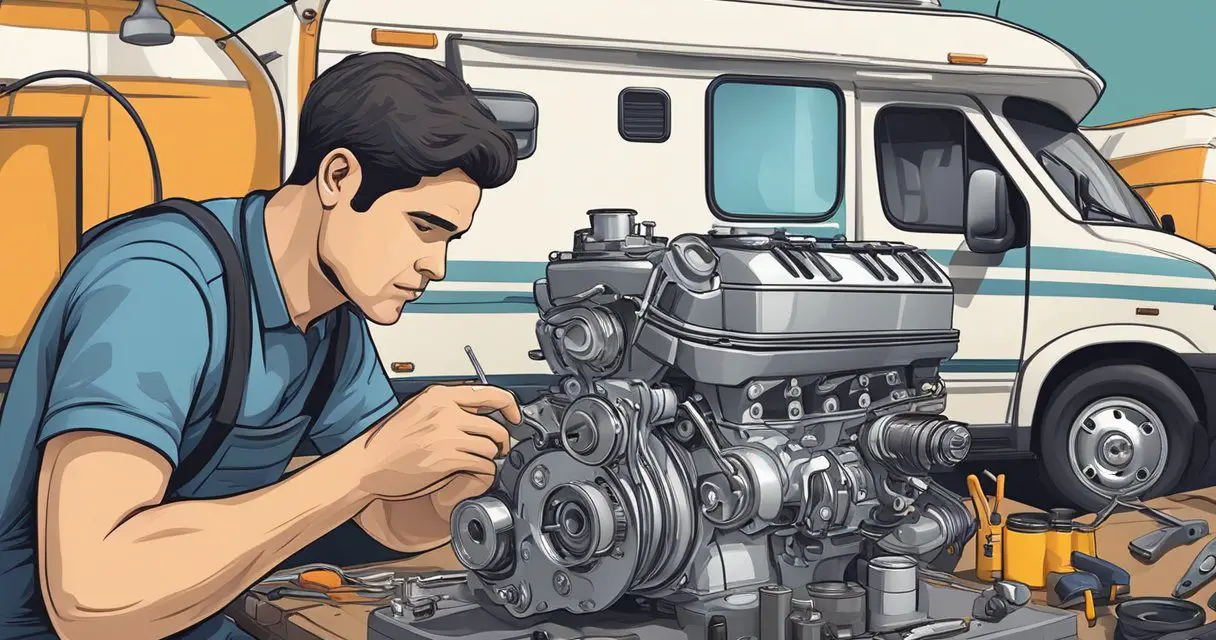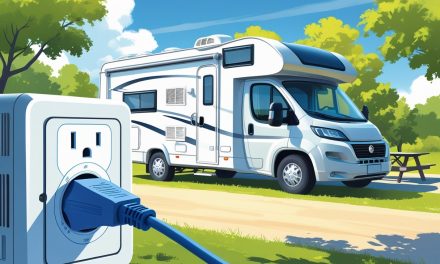For those venturing into RV ownership, learning how to work on their vehicle is both practical and rewarding. Mastering basic maintenance and repair skills not only enhances confidence but also ensures smoother travels. Knowing how to handle basic RV tasks can save time and money and make every trip more enjoyable.
The process of getting acquainted with RV mechanics can sometimes seem overwhelming for new owners. By starting with foundational tasks and gradually expanding their skills, RV enthusiasts can turn what might seem like a daunting challenge into a fulfilling experience.
1) Take a hands-on RV training course to learn practical skills.
Would you like to save this article?
For those looking to tackle RV maintenance and repair, hands-on training is a great step. Courses usually offer a mix of classroom learning and practical experience. Participants can engage directly with RV components, which helps them understand how each part functions.
The National RV Training Academy, among others, provides a structured environment for learners. Students work side-by-side with experienced technicians, gaining valuable insights. This approach not only builds confidence but also enhances troubleshooting skills.
Considering a hands-on course can be ideal for both beginners and experienced RV owners looking to broaden their skills. Such programs often cover various topics, from basic maintenance to more complex repair techniques. With practical training, they can hit the road with assurance and be prepared for unforeseen challenges.
2) Join RV enthusiast groups for tips and shared experiences.
Joining RV enthusiast groups can be a great way to learn how to work on an RV. These communities are full of experienced RVers who are eager to share their knowledge and experiences.
Online platforms like Facebook and specialized forums such as RV.net or iRV2.com are popular places where RV enthusiasts gather. These spaces offer valuable advice on everything from DIY repairs to cost-saving techniques.
Participating in these groups can lead to meaningful interactions and sometimes even meetups. Engaging with these communities can expand one’s network and provide real-world insights that are not always available elsewhere.
3) Watch online tutorials focused on RV maintenance and operation.
Online tutorials are a great way to learn about RV maintenance and operation. Platforms like YouTube offer a vast collection of videos that can help new and seasoned RVers alike. These videos cover a range of topics, from basic maintenance tasks to more advanced troubleshooting techniques.
Watching online tutorials allows RV owners to learn at their own pace. They can pause, rewind, and play videos as needed to fully understand the instructions. This flexibility makes it easier for individuals to acquire practical skills without feeling rushed.
Alongside YouTube, there are dedicated RV education platforms offering structured video courses. These resources provide step-by-step guidance with professional insights into safely operating and maintaining various types of RVs. Whether it’s understanding the electrical system or learning how to winterize an RV, these tutorials are an invaluable resource for any RV enthusiast.
4) Become an Apprentice
One of the most effective ways to gain these skills is by becoming an apprentice under an experienced RV technician or mechanic. This hands-on approach allows you to learn the intricacies of RV maintenance, from engine care to plumbing and electrical systems, directly from someone who has mastered the craft.
By working closely with a seasoned professional, you can acquire the practical knowledge and confidence needed to keep your RV in top condition.
Apprenticeships offer a structured learning environment where you can gradually take on more complex tasks as your skills improve. Unlike online tutorials or classroom settings, an apprenticeship provides real-world experience that is invaluable.
You’ll learn how to diagnose and fix issues on the spot, understand the nuances of different RV models, and get acquainted with the tools and equipment essential for maintenance and repairs. Additionally, working alongside a mentor allows you to ask questions and receive immediate feedback, which accelerates the learning process and helps you avoid common pitfalls.
Moreover, becoming an apprentice not only equips you with technical skills but also introduces you to a community of RV enthusiasts and professionals.
This network can be a valuable resource for future advice, support, and even job opportunities if you decide to turn your newfound skills into a career. As you progress, you may find yourself helping other RV owners, sharing tips, and becoming a part of a passionate community that values self-reliance and adventure.
So, if you’re eager to take control of your RV maintenance and become more self-sufficient, consider seeking out an apprenticeship. It’s an investment in your skills and your future adventures on the open road.
5) Read beginner’s guides tailored to RV types and equipment.
Learning about RVs can be overwhelming due to the variety of types and equipment. Beginner’s guides provide structured, accessible knowledge for navigating this landscape.
Many guides focus on specific RV types, whether it’s a motorhome, trailer, or camper van. Understanding these differences helps individuals make informed choices.
Equipment-specific manuals are important too. They break down complex systems like plumbing and electrical into simpler language. Accessing these tailored resources ensures everything one needs is covered.







